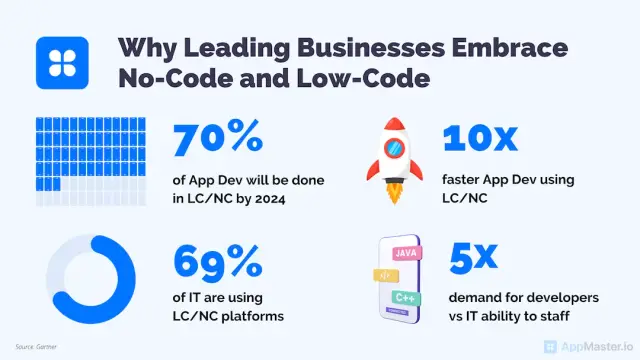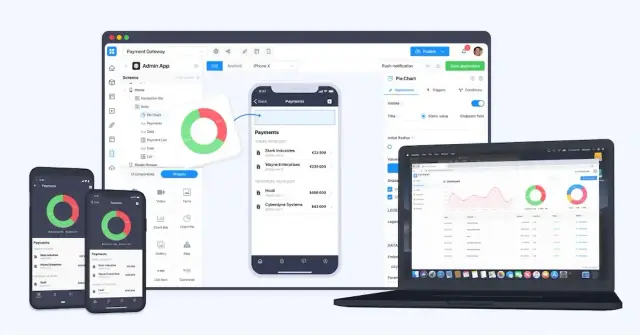Democratizing AI Development with Low-Code Solutions
Explore the future without barriers in AI development made possible by low-code platforms. Learn how they are making AI accessible and beneficial for businesses.

Unlocking AI Potential for All
The allure of harnessing Artificial Intelligence (AI) has always been coupled with the complexity of its underpinnings. Until recently, the power to reshape industries with algorithms and data models resided in the hands of a select few who could navigate the labyrinthine complexity of machine learning and data science. The domain of AI was a walled garden accessible only to those with extensive programming knowledge and technical training. Yet, this scenario is rapidly changing with the advent of low-code solutions that flatten the learning curve and democratize access to AI technology.
Low-code platforms have emerged as the key to unlocking the potential of AI for a diverse audience beyond just data scientists and developers. These platforms empower professionals across different levels of technical expertise to design, implement, and deploy AI-driven solutions through features like visual development interfaces, drag-and-drop functionality, and a library of pre-built models. Business analysts, subject matter experts, and even entrepreneurs can now take part in the AI revolution, tapping into the power of data analysis and machine learning to solve real-world problems.
The spread of low-code solutions is an advancement in technology platforms and a transformation in the way we approach problem-solving and innovation. By making AI development tools readily available and user-friendly, low-code democratizes inventiveness, freeing creativity from the shackles of code and syntax. This societal shift is akin to the move from command-line operating systems to graphical user interfaces, which opened up computing to the masses and propelled digital creativity and productivity.
In this blossoming era where AI potential is for all to seize, organizations of all sizes stand to redefine their operations and offerings. Small businesses can leverage predictive analytics to anticipate market trends, while educators can use AI to personalize learning experiences. Healthcare providers can deploy diagnostic tools to enhance patient care, and governments can implement smarter systems for public service delivery. The promise of AI, once a distant dream for many, is now within reach, fundamentally reshaping the competitive environment across industries.
At the core, low-code development platforms are not just about simplifying coding — they're about amplifying human potential. They serve as a testament to the fact that the future of technology is not solely in the code itself, but in the hands of those who use it. As technology advances, the true measure of success will be its ability to be wielded by everyone — opening the doors to an age of innovation defined by inclusivity, diversity, and universal access to the building blocks of AI.

The need for more efficient adoption methods grows as AI becomes more integral to business strategy. Low-code development platforms emerge as a key solution to this challenge, offering a bridge between complex AI technologies and business professionals seeking to leverage them.
Low-code platforms reduce the technical expertise required to create AI-powered solutions. They provide a visual development environment where users can drag and drop components, use pre-built templates, and configure AI functionalities without writing extensive lines of code. This speeds up the development process and enables more professionals to innovate with AI.
These platforms are designed to integrate with various AI services seamlessly, which can include machine learning models, cognitive services, and automated data processing tools. Furthermore, low-code approaches streamline the deployment of AI applications by managing complex infrastructural issues, such as provisioning resources, scaling, and ensuring security compliance.
Adopting low-code platforms fosters collaboration across departments, blending business professionals' domain expertise with IT specialists' technical prowess. This cross-functional collaboration results in more effective AI solutions that are closely aligned with business requirements.
In the context of AI, low-code platforms play an educative role as well, by lowering the barrier to understanding and working with AI technologies. Employees can learn through hands-on experience, creating a learning-by-doing environment that contributes to cultivating internal AI expertise.
Lastly, low-code platforms enable organizations to prototype and iterate rapidly. Companies can test different AI models and scenarios with minimal risk and investment, and then scale up successful prototypes to full production without the need for a complete overhaul.
Benefits of Low-Code AI for Businesses
Adopting AI has become critical as businesses strive to remain relevant and competitive in an increasingly fast-paced market. Still, integrating AI technology poses significant challenges, including the need for specialized knowledge and the resources required for development and maintenance. Low-code AI platforms offer a compelling solution, presenting several benefits that cater to the varied needs of businesses.
One fundamental advantage is the significant reduction in development time. Traditional AI development is a lengthy process, often taking months to go from concept to deployment. Low-code platforms streamline this process with pre-built AI functionalities and templates. This means businesses can implement AI features such as chatbots, image recognition, and predictive analytics with minimal coding, slashing the time-to-market.
Reduced development costs are another benefit. Businesses can manage expenses more effectively by eliminating the need for a large team of AI experts. Low-code AI development can often be undertaken by existing staff, reducing the reliance on expensive external consultants or iterative training for current employees.
The use of low-code solutions enhances business agility. In today's market, the ability to quickly adapt to new trends and customer demands is paramount. Low-code platforms empower businesses to create and adjust AI capabilities in real-time, enabling them to swiftly pivot and respond to emerging opportunities or threats.
Moreover, low-code AI fosters an inclusive culture of innovation. With intuitive drag-and-drop interfaces and visual workflows, employees across an organization can contribute to AI projects without understanding complex algorithms or programming languages. This broad participation can lead to a surge in creative solutions and a strong competitive edge.
Focusing on scalability, low-code and no-code AI platforms like AppMaster enable businesses to grow their AI initiatives as their needs evolve. The modular nature of low-code solutions allows for incremental enhancements, meaning that as a company expands, its AI functionalities can be scaled up without significant rework or additional investment.
Lastly, low-code AI offers the possibility of democratized access to advanced technologies. Smaller businesses, which the entry costs of traditional AI may have previously barred, can now step into the arena and compete with larger corporations. Low-code AI enables companies of all sizes to innovate and improve their service offerings by leveling the playing field.
The benefits of low-code AI for businesses are multifaceted and significant. From faster deployment to improved cost management, enhanced agility, and the democratization of technology, low-code AI platforms are transforming how companies approach and utilize AI — leading to smarter business operations and a stronger position in the market.
The Future of AI with Low-Code Accessibility
The intersection of AI with low-code development platforms is paving the way for a future where advanced technical skills are not a prerequisite for leveraging the power of AI. One envisions a world where AI can be as ubiquitous as spreadsheets, with business professionals capable of integrating intelligent algorithms into their workflows as easily as they manipulate data on a spreadsheet today.
This future stands on the horizon, thanks to the ever-improving capabilities of low-code repositories that are making AI components available in a plug-and-play manner. We are already seeing platforms where sophisticated AI services — such as natural language processing, computer vision, and predictive analytics — can be added to applications with just a few clicks. The implications for productivity and innovation are significant. For example, sales teams could use AI to analyze customer interactions and forecast sales trends, HR departments could leverage AI to optimize recruitment processes, and manufacturing units could use predictive maintenance to decrease downtime.
Moreover, AI availability within low-code platforms will likely lead to the evolution of more tailored AI solutions that cater to specific industry needs. As users across various sectors engage with these platforms, we will witness an unprecedented scale of unimaginable customized solutions when AI development was limited to a select group of data scientists and developers.
Education will also play a critical role in this AI-enabled future. As AI becomes a more integral part of the business toolkit, educational initiatives focused on understanding AI concepts and low-code proficiency will be essential to empower the workforce. Low-code platforms like AppMaster already provide a learning curve that supports individuals new to the field. Through user-friendly design and an emphasis on visual programming, platforms like these are positioning themselves as educational gateways to an AI-driven work environment.
We are on the cusp of a transformative period where AI's full potential can be unleashed by a much broader base of users. Low-code solutions are the catalysts in this change, enabling businesses and individuals to create sophisticated AI-driven solutions without the deep technological expertise once deemed necessary. This leveling of the playing field is one of the most exciting developments in the tech world, and it brings us a step closer to a future where AI plays a fundamental role in solving real-world challenges.
AppMaster: Pioneering No-Code AI Integration
As artificial intelligence (AI) shapes the future of various industries, the development of AI applications remains complex and often requires specialized skills. AppMaster, with its cutting-edge no-code platform, emerges as a game-changer. By enabling users without deep technical expertise to build and integrate AI functionalities into their applications, AppMaster is democratizing AI development and empowering a wider range of creators.
The AppMaster platform stands out for its ability to automate the labor-intensive aspects of software development. Users can design data models, develop business logic, and manage REST API and WSS Endpoints through a visual interface. The integration of AI within this ecosystem is seamless. For instance, users can leverage pre-built AI components or create custom AI functionalities that can be easily integrated into web and mobile applications. This supports the rapid prototyping and deployment of AI-driven solutions.

Moreover, AppMaster takes care of the full lifecycle of application deployment. Once users design their application blueprints, the platform generates the source code, compiles the applications, executes tests, and deploys to the cloud, all within a span of minutes. This highly efficient process is particularly significant when working with AI, since it allows for swift iteration and testing, which are crucial for developing reliable AI systems.
For businesses looking to explore AI without the high costs and resource-intensive aspects of traditional development, AppMaster offers a compelling solution. It’s not just about simplifying development; the platform also ensures scalability and performance by generating backend applications in Go, known for its efficiency in handling high-load use cases. AppMaster equips users with the tools to bring their AI visions to life, whether for predictive analytics, natural language processing, or complex decision-making algorithms.
The democratization of AI brings us a step closer to a future where technology plays an even bigger role in addressing business challenges, driving innovation, and improving societal outcomes. By pioneering the integration of low-code and no-code development with AI, AppMaster is not only facilitating this transition but is also setting a standard for accessibility and efficiency in AI application development.
Conclusion
The movement towards democratizing AI with the support of low-code solutions is changing the face of technology and business. This shift enables innovation and the creation of intelligent applications that were once the exclusive domain of data scientists and AI specialists. By simplifying the complexity of AI, low-code platforms empower a diverse set of users to contribute to the development of AI-driven solutions, thereby harnessing the true potential of AI across various industries.
By breaking down technical barriers, low-code platforms are not only opening up opportunities for businesses to optimize their operations but are also contributing to a broader understanding and integration of AI in everyday processes. The value brought about by this technological democratization can't be understated: it affords businesses of all sizes the ability to adapt quickly to market changes, enhances the creativity and productivity of their teams, and drives innovation at scale.
AppMaster is at the forefront of facilitating this transition towards a more inclusive AI environment. By offering a no-code solution that streamlines the creation and deployment of AI-infused applications, AppMaster stands as a testament to the power of low-code solutions to revolutionize how we approach AI development.
As we move forward, low-code platforms are likely to continue shaping the future of AI, making it an integral part of a new era where technology elevates human potential and where the synergy between human ingenuity and artificial intelligence leads to unprecedented growth and opportunities.
FAQ
Low-code platforms play a crucial role in AI by lowering the barriers to entry for AI development and helping to democratize access to AI technologies. They provide pre-built templates, intuitive interfaces, and tools that simplify the integration of AI into business applications, making it more accessible for non-specialists.
Low-code solutions can significantly reduce the development time and cost of AI projects, increase business agility through rapid prototyping, and encourage innovation by enabling a broader range of employees to contribute to AI initiatives. These platforms also help businesses quickly adapt to market changes and continuously improve their AI applications to stay competitive.
Yes, as low-code platforms evolve, they are increasingly capable of supporting more complex AI functionalities. This allows users to integrate advanced AI features into applications without needing deep technical expertise in AI.
The future of AI development with low-code platforms is expected to be one where AI is seamlessly integrated into the flow of everyday business processes and not just the domain of experts. AI is set to enhance user experiences, optimize operations, and provide valuable insights, all accessible through the use of low-code solutions.
AppMaster is pioneering the integration of low-code development with AI capabilities, by offering a no-code platform that simplifies the entire lifecycle of AI application development, from building and compiling to deploying. This supports the democratization of AI by making it easily accessible to users without extensive programming skills.
Democratizing AI through low-code platforms can transform businesses by streamlining complex challenges, fostering a culture of continuous innovation, and allowing for the rapid development and deployment of AI solutions. Businesses utilizing these solutions stand to gain significant competitive advantages and are better equipped to thrive in an increasingly AI-driven world.
Low-code AI influences innovation culture within organizations by facilitating participation from a broader range of employees in AI-related projects. It encourages experimentation and prototyping, enabling companies to innovate rapidly without the requirement for specialized AI knowledge.
Virtually every industry can benefit from the adoption of low-code AI, as it can be applied to a wide array of applications such as customer service automation, predictive maintenance, healthcare diagnostics, financial forecasting, marketing personalization, and more.





